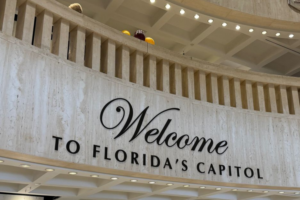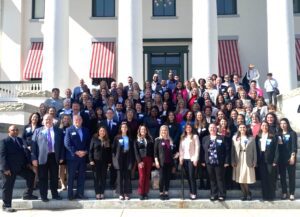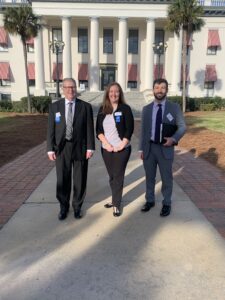Overview of Proposed Florida Employment Legislation for the 2024 Legislative Session
Reading Time: 3 minutes
Proactive monitoring of the developing employment legislation and regulations is beneficial for businesses to defray the potential costs of substantial, unprepared operational adjustments that may be required to obtain compliance with employment legislation after its passage. There’s no better way to get a pulse on proposed employment legislation than traveling to Tallahassee and talking about them, which occurred on February 1, 2024. The blog post below briefly summarizes the Tallahassee efforts of the delegation from the Society of Human Resource Management, Jacksonville Chapter (SHRM Jacksonville), and highlights the employment legislation that garnered the most attention.
may be required to obtain compliance with employment legislation after its passage. There’s no better way to get a pulse on proposed employment legislation than traveling to Tallahassee and talking about them, which occurred on February 1, 2024. The blog post below briefly summarizes the Tallahassee efforts of the delegation from the Society of Human Resource Management, Jacksonville Chapter (SHRM Jacksonville), and highlights the employment legislation that garnered the most attention.
On February 1, 2024, the delegation from SHRM Jacksonville met with legislators and discussed pending employment legislation alongside other organizations affiliated with HR Florida, the state arm of the Society for Human Resource Management (SHRM). The delegation provided practical insights and perspectives to lawmakers related to the pending legislation described below and conducted targeted meetings with key stakeholders including Senator Lori Berman and 6 legislative aides serving Senators and Representatives representing the Greater Jacksonville Area.
In sum, no employment-related bills appeared primed for passage, but many bills sparked discussion on dramatic changes to Florida’s regulatory landscape that should be monitored. The discussions encompassed a diverse range of proposed bills, with three primary categories emerging as focal points of debate: (1) minors in the workforce, (2) regulatory reform, and (3) general policy.
 First, regulations related to minors in the workforce were analyzed and debated. Notably, House Bill 49 garnered momentum, seeking to loosen employment restrictions for minors aged 16 and 17, allowing increased working hours while ensuring continued school attendance to bolster Florida’s workforce and add economic opportunity for families who rely on a minor’s employment. Additionally, House Bill 917 proposed broadening minors’ ability to work in specified trades, provided that the minors obtain proper licensure.
First, regulations related to minors in the workforce were analyzed and debated. Notably, House Bill 49 garnered momentum, seeking to loosen employment restrictions for minors aged 16 and 17, allowing increased working hours while ensuring continued school attendance to bolster Florida’s workforce and add economic opportunity for families who rely on a minor’s employment. Additionally, House Bill 917 proposed broadening minors’ ability to work in specified trades, provided that the minors obtain proper licensure.
Second, reform of state regulations concerning heat exposure and the proposed establishment of a Florida Division of Labor were discussed. Senate Bill 1492 gained traction, aiming to prevent political subdivisions from imposing heat exposure requirements beyond federal standards, thereby maintaining clarity of compliance requirements for Florida businesses. In contrast, House Bill 1199 proposed the creation of a Florida Division of Labor charged with establishing and enforcing Florida-specific labor regulations.
Lastly, other bills addressing general workplace policies and practices captured some attention. House Bill 599 attempts to prohibit the penalization of an employee’s or employer’s failure to use requested pronouns. Senate Bill 40 attempts to provide employees with a statutory right, and potential cause of action, related to requesting to review their “employee contract,” though the definition of “employee contract” was not set forth with specificity in the legislation. House Bill 839 proposed protected leave for relatives of crime victims to participate in or attend associated criminal proceedings, though as drafted it currently lacked restrictions related to the length of such leave. House Bill 11 proposed prohibitions on the use of restrictive covenants in the medical field.
to use requested pronouns. Senate Bill 40 attempts to provide employees with a statutory right, and potential cause of action, related to requesting to review their “employee contract,” though the definition of “employee contract” was not set forth with specificity in the legislation. House Bill 839 proposed protected leave for relatives of crime victims to participate in or attend associated criminal proceedings, though as drafted it currently lacked restrictions related to the length of such leave. House Bill 11 proposed prohibitions on the use of restrictive covenants in the medical field.
In conclusion, no bills appeared primed for immediate passage. However, House Bill 49 and House Bill 917 (both passing in the House and now being debated in the Senate), as well as Senate Bill 1492 emerged with notable momentum, though their likelihood of passage remains speculative. The potential operational effects, if any, arising from these pieces of legislation, and others, should be analyzed with the assistance of competent legal counsel to ensure that businesses minimize the risk of unexpected expenditures related to rushed compliance.

